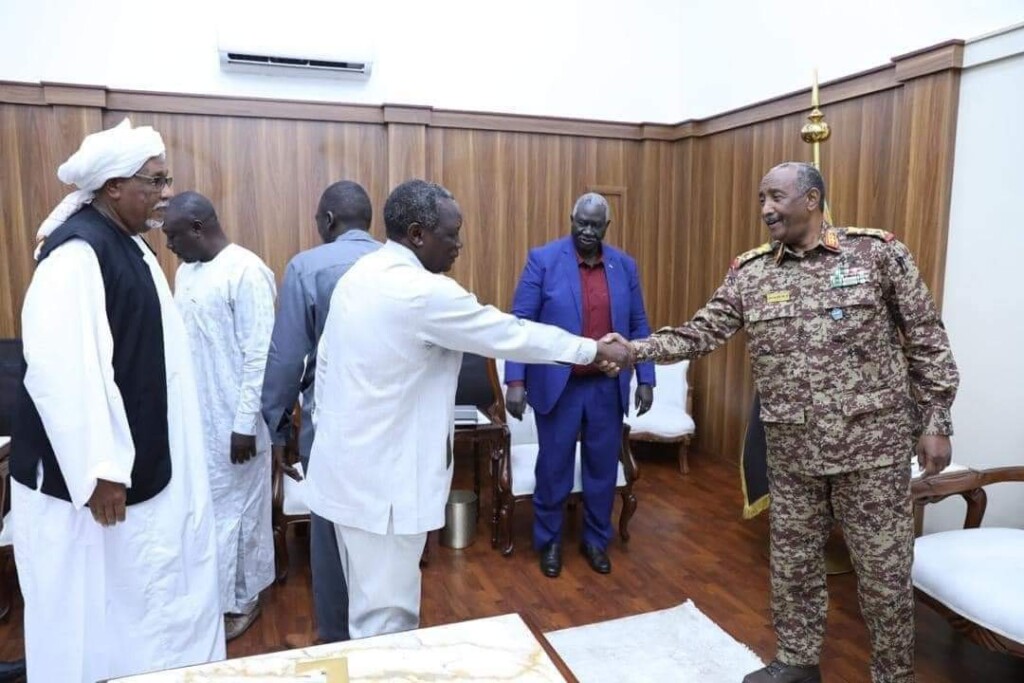New National Forces Coordination ‘to sign charter with Sudan army’

The Sudanese National Forces Coordination (NFC), headed by Malik Agar, meets with army commander Abdelfattah El Burhan in Port Sudan on March 13 (Photo: NCF FB page)
The recently formed Sudanese National Forces Coordination (NFC) coalition headed by Malik Agar, vice president of the Sovereignty Council, has announced its intention to sign a political accord with the Sudanese Armed Forces (SAF).
SAF commander and president of the Sovereignty Council, Abdelfattah El Burhan, met with an NFC delegation headed by his deputy Malik Agar in Port Sudan on Wednesday.
The new coalition held its founding conference last week. Members are political groups and rebel movements that sided with the SAF in the ongoing war with the Rapid Support Forces (RSF), and include the Sudan People’s Liberation Movement-North faction in Blue Nile region led by Agar (SPLM-N Agar), the Democratic Bloc group of Darfur rebel movements, the Democratic Unionist Party (DUP), and the eastern Sudan Beja Nazirs Council faction headed by Sayed Tirik, in addition to several other groups*.
The Sovereignty Council’s media bureau reported yesterday that the NFC affirmed its full support for the SAF during the meeting and condemned “the human rights violations and systematic genocide committed by the RSF against citizens and civilian objects”.
The coalition lauded the popular resistance groups combating alongside the army, and announced that it will soon sign a political charter with the SAF.
Mustafa Tambour, head of the breakaway Sudan Liberation Movement-Tambour faction and spokesperson for the new coalition said in a press statement after the meeting that they briefed El Burhan about the results of the founding conference of the “National Democratic Forces Coordination”.
He further announced the coalition’s support for a Sudanese-Sudanese dialogue that “should not exclude anyone”, but added that “any political process must not be launched until after the elimination of the RSF”, echoing El Burhan’s stance on the subject.
‘Suddenly’
Kholood Khair, founding director of Confluence Advisory, a think-and-do-tank in Khartoum, reacted on the news about a new political charter by stating that “The political opportunism of Sudan’s elites knows no bounds. SAF scores some military victories and suddenly a political declaration is signed. Déjà vu, anyone?”
In a post on X yesterday, she referred to the agreement signed by RSF Commander Mohamed ‘Hemedti’ Dagalo with the Civil Democratic Forces (Tagaddum) in Addis Ababa on January 2. “This, too, is short-sighted & superfluous. So, so what?
“And, though this is obvious, it should be noted that this is not a ‘civilian’ entity. It’s headed by Agar who is the head of an armed movement that, like the others, has NOT demilitarised. The NFC (should be CFN) also has no stated aims, it’s effectively another non-entity.
“This political tendency merely perpetuates an outcome within Sudan’s politics where the strongest actor, usually military, subsumes armed and civilian entities and make them into husks, neutralising any attempts at demilitarising Sudan. And round and round we go…”
* The members of the National Forces Coordination (NFC) attended a six-day inter-Sudanese dialogue initiated by the Egyptian government in Cairo in January last year, in an attempt to align the various political groups in Sudan, in order to agree on a new transitional civilian government after the former one, chaired by PM Abdalla Hamdok, was removed in a joint SAF-RSF coup d’état in October 2021.
The coup was backed by Agar, who was appointed member of the Sovereignty Council following the signing of the Juba Peace Agreement (JPA) with the Hamdok government a year earlier, Minni Minawi, head of an SLM faction who became governor of the Darfur Region, and Jibril Ibrahim, former leader of the Justice and Equality Movement (JEM) who was appointed Minister of Finance after the JPA.
The 85 participants of the Cairo dialogue agreed on a fully civilian transitional government and on mechanisms for selecting members of the executive and sovereignty councils. They called on the junta forces to distance themselves from all political and societal forces and not to interfere in political affairs. According to the final press statement, they also agreed to form an alliance, the National Forces Coordination “as an umbrella for all participants to carry out the task of communicating with all parties supporting the democratic transition”.
In October 2022, members of the Democratic Bloc, together with other political groups, signed a political declaration stipulating ‘three governing bodies’ during the transitional period: a sovereign authority, a cabinet, and a legislative council. A new military council would be involved in the formation of the new cabinet.











 and then
and then